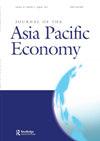ESG scoring and forecasting in China: advancing sustainable business with multidimensional modeling
IF 1.5
4区 经济学
Q3 ECONOMICS
引用次数: 0
Abstract
AbstractThe triad of Environmental, Social, and Governance (ESG) determinants in the contemporary global business environment has become integral to corporate longevity and ethical performance. With China’s significant economic influence and unique socio-cultural tapestry, understanding its ESG dynamics is crucial for domestic and international stakeholders. This comprehensive research introduces an innovative multidimensional ESG scoring paradigm designed for the Chinese market. Built on a robust data foundation from Bloomberg, this model encompasses an 11-year trajectory of 1,496 companies, making it one of the most exhaustive studies in this domain. Integrating advanced mathematical and machine learning models and techniques augments the model’s predictive accuracy and ensures its resilience to rigorous validation processes. By delving deep into the complexities of China’s ESG landscape, this study elucidates the intricate interdependencies of these factors, thereby offering a roadmap for sustainable business practices in China.Keywords: ESG dynamicsChinese business environmentmultidimensional ESG modelpredictive machine learningsustainable corporate practices Disclosure statementNo potential conflict of interest was reported by the author(s).Additional informationFundingThis research was generously supported by the National Social Science Foundation of China (Grant Number 21BGL183) and Fundamental Research Funds for the Central Universities (Grant Number SK2022130).中国的ESG评分和预测:用多维模型推进可持续业务
摘要在当代全球商业环境中,环境、社会和治理(ESG)的三重决定因素已经成为企业寿命和道德绩效的组成部分。鉴于中国巨大的经济影响力和独特的社会文化格局,了解其ESG动态对国内和国际利益相关者至关重要。这项全面的研究介绍了一种为中国市场设计的创新的多维ESG评分范式。该模型以彭博社(Bloomberg)提供的强大数据为基础,涵盖了1496家公司的11年发展轨迹,是该领域最详尽的研究之一。集成先进的数学和机器学习模型和技术增强了模型的预测准确性,并确保其对严格验证过程的弹性。通过深入研究中国ESG格局的复杂性,本研究阐明了这些因素之间错综复杂的相互依存关系,从而为中国的可持续商业实践提供了路线图。关键词:ESG动态中国商业环境多维ESG模型预测性机器学习可持续企业实践披露声明作者未报告潜在利益冲突本研究得到国家社会科学基金(批准号:21BGL183)和中央高校基本科研业务费专项资金(批准号:SK2022130)的资助。
本文章由计算机程序翻译,如有差异,请以英文原文为准。
求助全文
约1分钟内获得全文
求助全文
来源期刊

Journal of the Asia Pacific Economy
ECONOMICS-
CiteScore
3.70
自引率
7.10%
发文量
58
期刊介绍:
Journal of the Asia Pacific Economy (JAPE) is concerned primarily with the developing economies within Pacific Asia and South Asia. It aims to promote greater understanding of the complex factors that have influenced and continue to shape the transformation of the diverse economies in this region. Studies on developed countries will be considered only if they have implications for the developing countries in the region. The journal''s editorial policy is to maintain a sound balance between theoretical and empirical studies. JAPE publishes research papers in economics but also welcomes papers that deal with economic issues using a multi-disciplinary approach. Submissions may range from overviews spanning the region or parts of it, to papers with a detailed focus on particular issues facing individual countries. JAPE has a broad readership, which makes papers concerned with narrow and detailed technical matters inappropriate for inclusion. In addition, papers should not be simply one more application of a formal model or statistical technique used elsewhere. Authors should note that discussion of results must make sense intuitively, and relate to the institutional and historical context of the geographic area analyzed. We particularly ask authors to spell out the practical policy implications of their findings for governments and business. In addition to articles, JAPE publishes short notes, comments and book reviews. From time to time, it also publishes special issues on matters of great importance to economies in the Asia Pacific area.
 求助内容:
求助内容: 应助结果提醒方式:
应助结果提醒方式:


